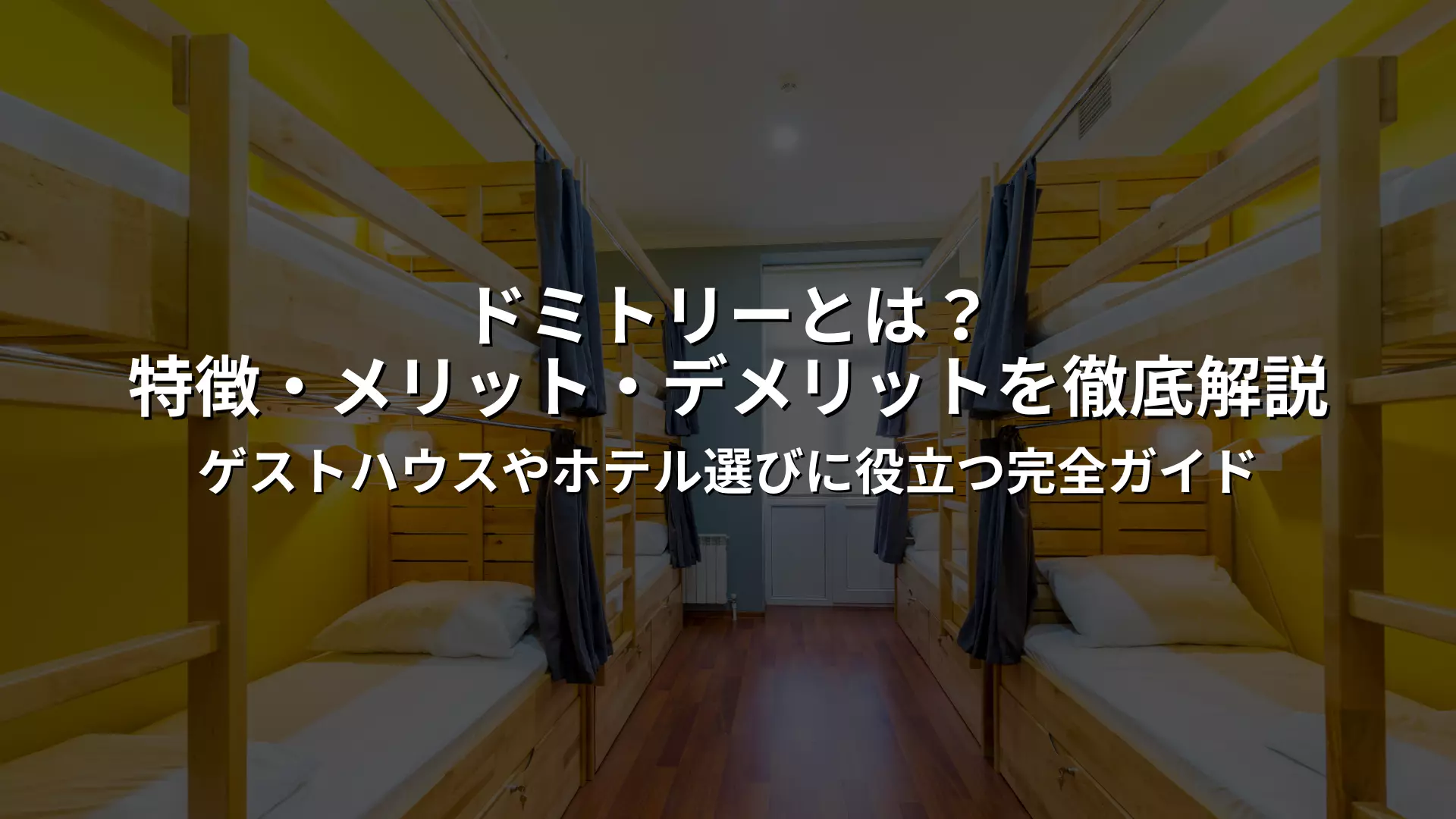What is a dormitory? Its meaning and basic style
Dormitories are a type of shared accommodation where multiple travelers sleep in the same room, and are typically found in guesthouses, hostels, and backpacker hotels. They feature multiple beds in one room, allowing for lower accommodation costs. They are commonly found in tourist destinations and urban areas around the world, and are ideal for budget-conscious travel and long-term stays.
From here, we will explain in detail the origin and history of the word dormitory, its position in the hotel industry, as well as bed arrangements and room types.
The origin and history of the word "dmitry"
The word "dormitory" comes from the Latin "dormitorium" (a place to sleep), and originally referred to shared bedrooms in monasteries and boarding houses. From the late 19th century through the 20th century, they became popular as student dormitories and military lodgings, and eventually developed into a form of accommodation for travelers.
Today, it is commonly found in guesthouses, hostels, and budget hotels, and has become a part of travel culture around the world. In Europe and Southeast Asia in particular, various dormitory-style accommodations have become popular among tourists and backpackers.
The role of dormitories in guesthouses and hotels
Dormitories in guesthouses and hotels are positioned as an economical accommodation option that is cheaper than private rooms. Since travelers share the same space, they are also characterized by the fact that they facilitate international interaction and the exchange of information. In urban hotels, they are used as a base for tourism and business, while in guesthouses in rural and tourist destinations, they are used as a base for long-term stays and workcations.
There are also a variety of accommodation options to suit the needs of users, such as women-only dormitories and family dormitories, giving guests greater flexibility in their accommodation options.
Bed arrangement and room type
Dormitory bed arrangements vary depending on the facility, but they generally have multiple bunk beds or single beds, and are typically shared rooms for around 6 to 10 people. Recently, semi-private rooms with beds separated by curtains or partitions, as well as rooms with a more private feel similar to capsule hotels, have become more common.
In addition to mixed-gender dormitories, there are also women-only, men-only, and family-only categories, so you can choose according to your travel style and sense of security. In terms of facilities, most dormitories are equipped with power outlets, reading lights, and lockers, improving comfort.
Advantages of Dormitory
Dormitories are a style of accommodation widely found in guesthouses, hostels, and casual hotels, and offer many attractions to travelers. Their greatest feature is that they are cheaper than private rooms, making them ideal for budget-conscious travelers and long-term stays. Furthermore, because multiple beds are shared in the same room, it naturally fosters interaction among travelers, making them a great place for international encounters and information exchange. Furthermore, they are available in a variety of locations, from urban areas to rural areas rich in nature, making them a great attraction as they allow you to plan your own itinerary freely.
Here we will explain in detail the main benefits of dormitories from three perspectives.
Low-cost accommodation rates
The biggest advantage of dormitories is that they are significantly cheaper than hotels or private rooms. By placing multiple beds in one room, operating costs are kept down, allowing guests to stay at a reasonable price. In urban areas, the cost is around 2,000 to 4,000 yen per night, and in rural areas and guesthouses overseas, it can be even cheaper.
Despite the low price, clean bedding and basic amenities make it an ideal choice for travelers looking to save on accommodation, such as those on long trips or around the world. Another big attraction is that you can use the saved budget for sightseeing, meals, and experiential activities.
A community space where travelers can easily interact with each other
Dormitories are an environment where multiple travelers stay in the same room, making it easy for conversation and interaction to naturally occur. Guesthouses, in particular, have ample shared spaces such as shared lounges and kitchens, making it easy to exchange local information and make travel companions. You'll also meet many foreign travelers, which can lead to opportunities for cross-cultural exchange and language practice.
For backpackers and solo travelers, dormitories offer a unique charm that makes them less likely to feel lonely and often lead to unexpected encounters and friendships. This sense of community is something that cannot be found in private hotel rooms.
Freedom of location and diverse locations
Dormitories can be found in a wide range of locations, from city centers to tourist destinations, beach resorts, and mountainous areas. Guesthouse-style dormitories near stations or in downtown areas are convenient bases for sightseeing or business, while facilities in natural areas offer a resort-like feel. Travelers can also freely choose a location based on their budget and purpose, allowing for flexibility in short-term or long-term stays. Dormitory-style accommodations are also often used in small regional hotels and backpacker hostels overseas, offering an appealing range of accommodation options.
This variety of locations allows for great travel freedom.
Search for a room
Only furnished properties with appliances are listed!
Disadvantages of Dormitory
Dormitories are an attractive accommodation style that allows you to travel on a budget, but there are some things you should be aware of to ensure a comfortable stay. Because you share multiple beds with other travelers, privacy is inevitably limited, and it can be difficult to expect the quiet and freedom of a private room. Also, when staying in a guesthouse or hotel dormitory, you will be using shared spaces and facilities, so you will need to follow rules and etiquette. You will also need to adapt to a different environment, including different lifestyles and surrounding noise.
Here we will explain three major disadvantages.
Difficult to ensure privacy
In dormitories, multiple travelers share a room, and because most are simply separated by beds, it is difficult to ensure complete privacy like in a private room. Even with curtains and partitions, noise, people coming and going, and light leaks are unavoidable.
Some guesthouses and hotels offer semi-private rooms or capsule-style beds to enhance privacy, but these are not completely private spaces. Travelers who want to stay for a long time or concentrate on work should consider privacy as a priority when choosing their accommodation.
Compliance with rules and good manners are required
In dormitories, it is essential to follow rules and etiquette so that everyone can stay comfortably. For example, each facility has its own detailed rules about lights-out time, the volume of conversations in shared spaces, and how to use the kitchen and bathroom. Since travelers share beds and facilities, noise, using them without permission, and leaving luggage spread out too much can cause trouble. Some guesthouses and hotels will explain these rules on a bulletin board or at check-in, and you may be asked to leave if you do not follow the rules.
To ensure a safe stay, it is important to check the terms of use in advance and act with consideration.
Need to adapt to lifestyle and noise
In dormitories, travelers' lifestyles vary, so noise can occur due to late-night comings and goings, early morning preparations, and other factors. If jet-lagged foreign tourists, long-term residents, and short-term tourists are staying in the same room, their lifestyles may not match and they may feel stressed. Bringing earplugs and an eye mask can help alleviate the noise to some extent, but you can't expect a completely quiet environment.
Also, depending on the guesthouse or hotel, events and social gatherings may be held until late at night, so be aware that they may not be suitable for people who don't like noisy atmospheres.
Dormitory etiquette and points to note
Dormitories are an attractive way to travel at a low cost, but because multiple people share beds and spaces, it's essential to observe proper etiquette and precautions to ensure a comfortable stay. Guesthouses and hotel dormitories have rules in place to ensure a comfortable stay for all guests. In particular, managing luggage, taking security measures, being considerate to other guests, and bringing the right items to stay comfortably are all important points.
Here we will explain specific manners and points to note that will be useful for those using a dormitory for the first time.
Luggage management and security measures
In a dormitory, you share a room with other travelers, so you are responsible for managing your luggage and valuables. Most guesthouses and hotels provide lockers and locked storage spaces, but it's safer to bring and use a padlock or wire lock. Don't leave expensive cameras, computers, or cash near your bed; only take them out when you need them. We also recommend keeping your passport and important documents with you at all times, or using the safety deposit box at the front desk.
It is important to be aware of this type of security in order to prevent trouble while traveling.
Consideration for other guests
In dormitories, travelers with different lifestyles and cultures will be sharing the same space. For this reason, it's important to be mindful of noise and the volume of your conversations at night and early in the morning. Especially when checking in late at night or departing early in the morning, it's a good idea to minimize work around your bed and pack any necessary luggage in advance. When using a smartphone or tablet, it's also important to use earphones and lower the screen brightness to prevent light leakage.
Some guesthouses and hotels have set lights-out times, so following these rules is essential for a comfortable communal life.
Useful travel items to bring
To make your stay in a dormitory more comfortable, it's useful to bring along some small travel items. Earplugs and eye masks will help you sleep better by blocking out surrounding noise and light. A padlock or wire lock is also essential as a security measure and will keep your belongings safe. Quick-drying towels, slippers, and foldable eco-bags are also useful in guesthouses and hotels. If there isn't much storage space around your bed, it's recommended to bring a storage pouch with hooks or a small storage box to help you keep things tidy.
Having these items on hand will greatly improve your comfort during long stays or overseas trips.
Search for a room
Only furnished properties with appliances are listed!
Summary | Dormitories offer greater travel freedom
Dormitories are not only affordable, but also offer the opportunity to interact with other travelers and enjoy a variety of locations. However, they also have some drawbacks, such as limited privacy and stress due to differences in lifestyle.
When staying overnight, the keys to a comfortable stay are to manage your luggage, be mindful of etiquette, and make use of travel accessories such as earplugs and padlocks. Depending on your travel purpose and budget, understand the differences between hotels and guesthouses and choose the best accommodation style.





























